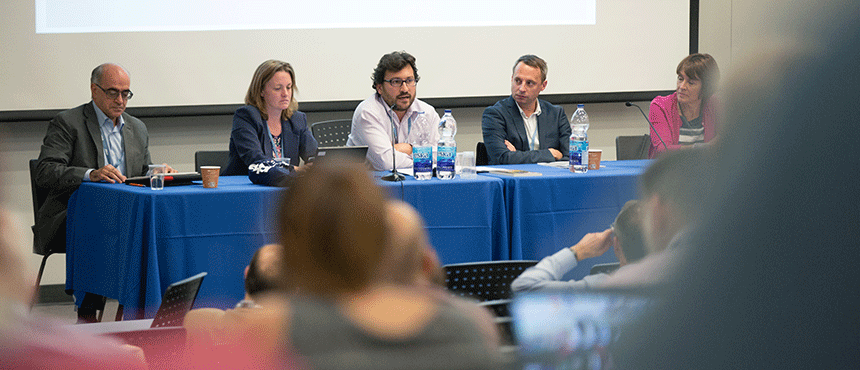Install the app
Install this application on your home screen for quick and easy access when you’re on the go.
Just tap then “Add to Home Screen”
Install this application on your home screen for quick and easy access when you’re on the go.
Just tap then “Add to Home Screen”
Install this application on your home screen for quick and easy access when you’re on the go.
Just tap then “Add to Home Screen”

Sponsored by Routledge, Taylor and Francis
Open Scholarship is having a transformative impact on academic research, practice and publishing. Publishers, universities, scholarly societies and individual academics are having to evaluate these new trends and decide how best to adapt their practices to the new emerging environment. Our three speakers will speak about these changes, the adjustments being made (or not made) and the implications for the future, followed by a Q&A. Are we experiencing a quiet revolution in academic research and publishing or are the changes more apparent than real?
Date and time: Wednesday 22 August, 17:00-18:00
Location: VMP 5, Lecture Hall B1
Chair: Alexandra Segerberg, Co-Editor in Chief of Political Research Exchange (PRX)
Speakers:
Sponsored by IPSA
To mark the 2018 release of the third Gender and Diversity Monitoring Report of the International Political Science Association, this Panel reflects on contemporary issues relating to gender and diversity in the discipline of political science from both an international and comparative perspective. The twentieth century saw the advent of the formal organization of the discipline into professional associations, as well as the rise of new social movements such as those promoting gender and racial equality and indigenous rights. Political science was sometimes slow to engage with these new political actors and with issues of inequality more generally. Today many questions and challenges remain. To what extent is the discipline of political science, including its professional associations, inclusive and representative in terms of focus and composition? What practices have professional associations or other institutions of political science adopted to foster diversity, and what lessons can be learned from these? Is the discipline accommodating diverse perspectives and approaches or is there still a hierarchy of knowledge favouring particular Global North frameworks and preoccupations? This Panel, comprising the authors of IPSA’s 2018 Gender and Diversity Monitoring Report, and leading experts, reflect on these questions from national and global perspectives.
Date and time: Thursday 23 August, 0900-1040
Location: VMP 5, Lecture Hall A
Chair: Marian Sawer, Australian National University
Co-Chair: Yasmeen Abu-Laban , University of Alberta
Speakers
Sponsored by the EPS Journal
In the 21st century, populism is sweeping the world. Populist leaders are in power in the most powerful country on the globe, the United States of America. They form governments in regional hubs such as Poland, the Philippines and Venezuela, and they threaten some of the most established Western Democracies including France and Italy. Yet, populism is not only a very successful contemporary political movement, it might also fundamentally alter how we teach political science. How should populism be integrated in an International Relations, Comparative Politics, or Women’s Studies class? How should it be taught? How does it change how we as political scientists see the world and how does it alter main political science theories and approaches? We will discuss these questions with four leading scholars, each giving a sub-disciplinary perspective.
Date and time: Thursday 23 August, 1100-1240
Location: VMP 5, Lecture Hall A
Chair: Daniel Stockemer, University of Ottawa
Speakers
Sponsored by IPSA Research Committee 17 “Comparative Public Opinion”
Political behaviour is an essential element of political culture of the population and an important indicator and predictor of the democratic political system development. In one of its broadest definitions, political behaviour is considered as an aggregated category for all those actions of private citizens by which they seek to influence – select, support or challenge – government and politics. This influence can be realized either directly by affecting the decision-making process or the course implementation of public policy, or indirectly – by participating in the nomination of the group of people who will make those decisions and policies. The range of concrete actions which can be defined as political behaviour varies from voting in national elections to organizing a demonstration, from writing a letter to a governmental official to establishing an online protest-community. Some forms of political participation, like voting, are among most traditional and have existed for many centuries while those which presume using the resources of the internet and social media are relatively new and evolving.
Development of comparative surveys in political science in the recent three decades has contributed to the establishment of an extensive empirical database in this field including such large-scale research programs as Eurobarometer, European Social Survey, International Social Survey Program, World Values Survey, European Values Study, Comparative National Elections Project, Comparative Study of Electoral System as well as the group of regional barometers – Afro Barometer, Arab Barometer, Asian Barometer, Eurasia Barometer, and Latinobarometro.
The Panel includes Papers analysing available empirical evidence from these and others quantitative research programs describing patterns, factors and consequences of political behaviour in different world regions and in a global comparative perspective. The main question which the Panel is focusing on is how we can use data and empirical evidence to deepen our understanding and prediction skills with regard to different forms of political behaviour and the role of values and norms in shaping participation patterns.
Date and time: Thursday 23 August, 15:50-17:30
Location: VMP 5, Lecture Hall A
Chair: Christian Haerpfer, University of Vienna
Speakers